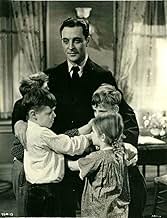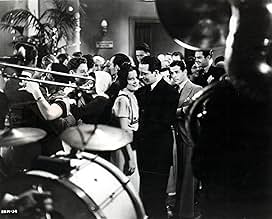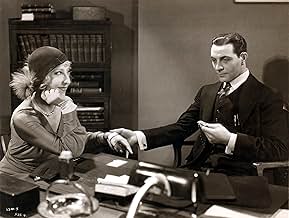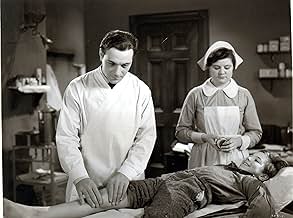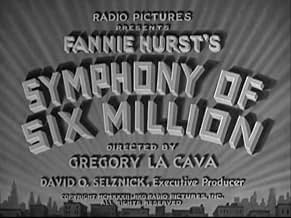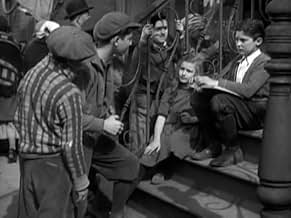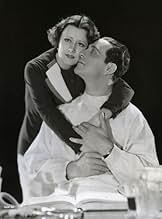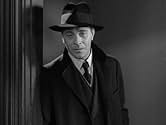IMDb RATING
6.1/10
476
YOUR RATING
A boy grows up to become a successful doctor at the expense of family relationships.A boy grows up to become a successful doctor at the expense of family relationships.A boy grows up to become a successful doctor at the expense of family relationships.
- Awards
- 2 wins total
Maurice Black
- Felix's Patient
- (uncredited)
Jesse De Vorska
- Mr. Horowitz - Hospital Patient
- (uncredited)
Harold Goodwin
- Intern at Hospital
- (uncredited)
Dorothy Gray
- Jessica - as a Girl
- (uncredited)
Julia Griffith
- Guest at Redemption Ceremony
- (uncredited)
Harry Holman
- Mr. Holman - Hospital Patient
- (uncredited)
Featured reviews
I was intrigued with the title of Six Million having a Jewish theme and what the connection would be since the movie was made in 1932. Once watching I was riveted to the story. The actors were custom made for their parts, hearing Oyfn Pripinchik being played throughout the movie made it heartwarming and endearing. A real Yiddishe Mama, an old fashioned papa (fabric cutter) and their children all living on the Lower East Side. The theme was that one of their son's wanted to be a doctor and took up a practice in their neighborhood caring for the poor (sometimes accepting no payment or very little) because it was rewarding for him. His brother saw it as wasting his talents and wanted him to become a Park Avenue big shot to make money. He did and lost his spirit. But wait til the middle and the end to see what happens. Have a box of tissues around. You will need it. Typical Fanny Hurst style.
If I were picking a list of films for a Jewish film festival, Symphony Of Six Million would be right at the top of my list. Gregory LaCava directed it and with a rather florid style that probably would not go over with today's audience. Still it is quite a picture of the Jewish experience in America during the Depression years.
Ricardo Cortez stars here as an idealistic young kid who seeing the disease and poverty around him in the Lower East Side neighborhood he comes from works and studies hard to become a doctor. Cortez indeed becomes a doctor and opens a clinic in the old neighborhood.
But as his family sees it, he's too good for that. His brother Noel Madison persuades him to move uptown and start gathering a rich patient list in order that the entire family can move out and their parents Anna Appel and Gregory Ratoff can now take it easy.
Soon enough though Cortez forgets why he became a doctor with all the acclaim he now receives and the big money he commands. In the end he faces crises involving the health of two loved ones. He fails one and saves the other and possibly saves his soul as well.
One thing LaCava did was capture the Lower East Side of New York Jewish neighborhood. Appel and Ratoff were both veterans of the Yiddish theater and they really carry their parts off well. Cortez was also Jewish in real life, real name Jacob Kranz. He only got that name because he got his start playing Rudolph Valentino knockoff parts on the silent screen.
Irene Dunne is Cortez's co-star and she has little to do here as the girl who loves him since childhood. The film totally focuses around Cortez and his family dynamic.
Too melodramatic for today's audience, still Symphony For Six Million is a great picture of Jewish life in America in the not too distant past.
Ricardo Cortez stars here as an idealistic young kid who seeing the disease and poverty around him in the Lower East Side neighborhood he comes from works and studies hard to become a doctor. Cortez indeed becomes a doctor and opens a clinic in the old neighborhood.
But as his family sees it, he's too good for that. His brother Noel Madison persuades him to move uptown and start gathering a rich patient list in order that the entire family can move out and their parents Anna Appel and Gregory Ratoff can now take it easy.
Soon enough though Cortez forgets why he became a doctor with all the acclaim he now receives and the big money he commands. In the end he faces crises involving the health of two loved ones. He fails one and saves the other and possibly saves his soul as well.
One thing LaCava did was capture the Lower East Side of New York Jewish neighborhood. Appel and Ratoff were both veterans of the Yiddish theater and they really carry their parts off well. Cortez was also Jewish in real life, real name Jacob Kranz. He only got that name because he got his start playing Rudolph Valentino knockoff parts on the silent screen.
Irene Dunne is Cortez's co-star and she has little to do here as the girl who loves him since childhood. The film totally focuses around Cortez and his family dynamic.
Too melodramatic for today's audience, still Symphony For Six Million is a great picture of Jewish life in America in the not too distant past.
Like a good soup, there are many elements to this movie. You first have to start with a good stock. The stock in this movie is the Lower East Side of New York in the 30's. The hustle and bustle, the rag pickers, the pushcarts, the tailors, the fishmongers. The whole flavor of life in the Jewish ghetto. Without this backdrop the movie would fall flat.
Next are the ingredients. The cast in this movie is genuine and almost flawless. Gregory Ratoff as the father, Ricardo Cortez (Jacob Krantz) as his son - the doctor, and Noel Madison as the ambitious brother. They are all authentic and they are all Jewish. I said almost flawless because there is one flaw. Irene Dunne is cast as the love interest. She is a good actress, but she is clearly a shiksa in looks, speech, and mannerism. She stood out like a pork chop amongst the knishes and kugels.
Finally, none of this would matter if somebody didn't know how to cook. The story isn't original - as a matter of fact it is still being done today. A young boy grows up in poverty. A poor but nourishing neighborhood. He is part of a loving family which supports him in his quest to become a doctor. He succeeds and decides to devote his life to helping the underclass in the ghetto. His brother, meanwhile, becomes a successful businessman and convinces him that he should move "uptown" in order to make more money and help the family. He moves up the social ladder, becomes a raging success, and is celebrated by the rich and famous. Through a series of tragedies it becomes clear to him that he has lost his roots. It is only here,at the very end, that we have to give the director (probably at the direction of the producer David O. Selznick) a little melodramatic license. This movie was made in 1932 and drama was the order of the day.
You want subtle - watch something else. You want to choke up and feel good. Watch this.
Note: Although it was entirely unintentional, and could not have been imagined, there is an uncanny connection between the title of this movie and the holocaust which came to light a decade later. Six Million.
Next are the ingredients. The cast in this movie is genuine and almost flawless. Gregory Ratoff as the father, Ricardo Cortez (Jacob Krantz) as his son - the doctor, and Noel Madison as the ambitious brother. They are all authentic and they are all Jewish. I said almost flawless because there is one flaw. Irene Dunne is cast as the love interest. She is a good actress, but she is clearly a shiksa in looks, speech, and mannerism. She stood out like a pork chop amongst the knishes and kugels.
Finally, none of this would matter if somebody didn't know how to cook. The story isn't original - as a matter of fact it is still being done today. A young boy grows up in poverty. A poor but nourishing neighborhood. He is part of a loving family which supports him in his quest to become a doctor. He succeeds and decides to devote his life to helping the underclass in the ghetto. His brother, meanwhile, becomes a successful businessman and convinces him that he should move "uptown" in order to make more money and help the family. He moves up the social ladder, becomes a raging success, and is celebrated by the rich and famous. Through a series of tragedies it becomes clear to him that he has lost his roots. It is only here,at the very end, that we have to give the director (probably at the direction of the producer David O. Selznick) a little melodramatic license. This movie was made in 1932 and drama was the order of the day.
You want subtle - watch something else. You want to choke up and feel good. Watch this.
Note: Although it was entirely unintentional, and could not have been imagined, there is an uncanny connection between the title of this movie and the holocaust which came to light a decade later. Six Million.
The scenes on Manhattan's Lower East Side in the 1930s are very convincing. The Jewish family in which Ricardo Cortez is a prodigy are too. The mama, played by Anna Appel, presages Molly Goldberg: "Yoo-hoo, Mrs. Fishbein," she calls out. Everything about the milieu seems authentic. (I'm not saying a 1932 film was shot on location but the setting was lovingly recreated.) Cortez, without his Latin-lover makeup and mannerisms, is very believable. I like him always. His name here is Felix and, though he plays a more somber than usual character here, it fits: His nearly omnipresent grin can remind one of Felix the Cat.
Gregory Ratoff is excellent as the stubborn patriarch of the household.
I watched it essentially because of my enduring fondness for Irene Dunne. (Director Gregory La Cava was no slouch either. His movies, especially the early ones like this, are always worthwhile.) Dunne plays a character named Jessica. Forgive me if I'm wrong but this does not sound like a name one would have been likely to encounter in the Jewish "ghetto," as the characters keep calling the neighborhood. She plays a teacher of blind children who limps.
She has very little to do and she acquits herself well. It seems like a waste of her special talents, though, and somewhat intrusive miscasting.
Nevertheless, the movie is touching and at times amusing. It's a rarity in its (generally) direct portrayal of lower-class Jewish life at the early part of the last century.
Gregory Ratoff is excellent as the stubborn patriarch of the household.
I watched it essentially because of my enduring fondness for Irene Dunne. (Director Gregory La Cava was no slouch either. His movies, especially the early ones like this, are always worthwhile.) Dunne plays a character named Jessica. Forgive me if I'm wrong but this does not sound like a name one would have been likely to encounter in the Jewish "ghetto," as the characters keep calling the neighborhood. She plays a teacher of blind children who limps.
She has very little to do and she acquits herself well. It seems like a waste of her special talents, though, and somewhat intrusive miscasting.
Nevertheless, the movie is touching and at times amusing. It's a rarity in its (generally) direct portrayal of lower-class Jewish life at the early part of the last century.
I have to say I expected more from this early thirties' Gregory La Cava Photoplay, especially since one of my favourite actresses, Irene Dunne, starred in it, but she had little time on screen (IMHO) and her role as a crippled girl, is pretty shallow, she had not yet blossomed into the great actress of "Theodora Goes Wild", "Love Affair" or "The Awful Truth".
This weepie (based on a Fannie Hurst novel, the same author who gave us "Back Street", "Imitation of Life", etc.) tells the story of a family of German immigrants, who lives in a poor Jewish ghetto in New York. Thanks to the profession of one of the sons, who grows to be a successful doctor (Ricardo Cortez), they find much better "horizons".
Ricardo Cortez, who has a Latin name but who was really born in Hungary, of Jewish background, does a fine job in the leading role, suffering a lot through the movie, 'cos he sacrifices his ideals for his family's sake. His parents are skillfully played by Anna Appel and Gregory Ratoff, who bring much truth to their interpretations.
I have to say that I enjoyed more the first part of the film which shows the life of this family when their sons were kids; there's a lot of "real" truth in the depiction of their lives, when they grow-up the film becomes more of a routine-soap opera.
Anyhow, I had never seen Ricardo Cortez in such a role, 'cos I was used to see him portraying continental men of the world or gangster-types, and as I stated before, he does a good job. Irene Dunne is less than half of what she had yet to achieve (in acting talent & beauty-I prefer her with longer hair).
No Pre-Codes aspects here, although it was released in 1932. Anyway, 1930's fans will have to see it.
This weepie (based on a Fannie Hurst novel, the same author who gave us "Back Street", "Imitation of Life", etc.) tells the story of a family of German immigrants, who lives in a poor Jewish ghetto in New York. Thanks to the profession of one of the sons, who grows to be a successful doctor (Ricardo Cortez), they find much better "horizons".
Ricardo Cortez, who has a Latin name but who was really born in Hungary, of Jewish background, does a fine job in the leading role, suffering a lot through the movie, 'cos he sacrifices his ideals for his family's sake. His parents are skillfully played by Anna Appel and Gregory Ratoff, who bring much truth to their interpretations.
I have to say that I enjoyed more the first part of the film which shows the life of this family when their sons were kids; there's a lot of "real" truth in the depiction of their lives, when they grow-up the film becomes more of a routine-soap opera.
Anyhow, I had never seen Ricardo Cortez in such a role, 'cos I was used to see him portraying continental men of the world or gangster-types, and as I stated before, he does a good job. Irene Dunne is less than half of what she had yet to achieve (in acting talent & beauty-I prefer her with longer hair).
No Pre-Codes aspects here, although it was released in 1932. Anyway, 1930's fans will have to see it.
Did you know
- TriviaAfter David O. Selznick became RKO's head of production in late 1931, he put the melodrama L'âme du ghetto (1932) (originally titled "Night Bell" after the Fannie Hurst story it is based on) into production, overseen by Pandro S. Berman. Selznick insisted that the original screenplay be rewritten to reclaim the ethnic touches from Hurst's story. Selznick likely wanted the film to serve as a mirror on to Jewish life, both of immigrants and their assimilated children. He himself changed the name of the film (a reference to New York City's population) as it was "more dramatic and dignified" than Night Bell. He also directed RKO music department chief Max Steiner to use symphonic music for the score and to have music throughout the picture. This was innovative as "talkies" rarely had an extensive score.
- GoofsAs is often the case when showing a devout Jewish home, a menorah, the traditional candelabrum, is displayed. However, this is used only once a year, so for the rest of the year it is put away. Having it on show is like having a Christmas tree up all year round to show that the family are Christians.
- Quotes
Dr. Schifflen: My boy, there are two kinds of men in our profession. Some are gifted with the spark of genius; some of us are... just doctors.
[walks to the door and opens it, then turns back toward Felix]
Dr. Schifflen: Felix Klauber, you're more capable than I, but if you don't go through with this operation, I will.
- ConnectionsFeatured in David O. Selznick: 'Your New Producer' (1935)
Details
- Release date
- Country of origin
- Languages
- Also known as
- Symphony of Six Million
- Filming locations
- Coney Island, Brooklyn, New York City, New York, USA(amusement park)
- Production company
- See more company credits at IMDbPro
Box office
- Budget
- $270,000 (estimated)
- Runtime
- 1h 34m(94 min)
- Color
- Aspect ratio
- 1.37 : 1
Contribute to this page
Suggest an edit or add missing content

